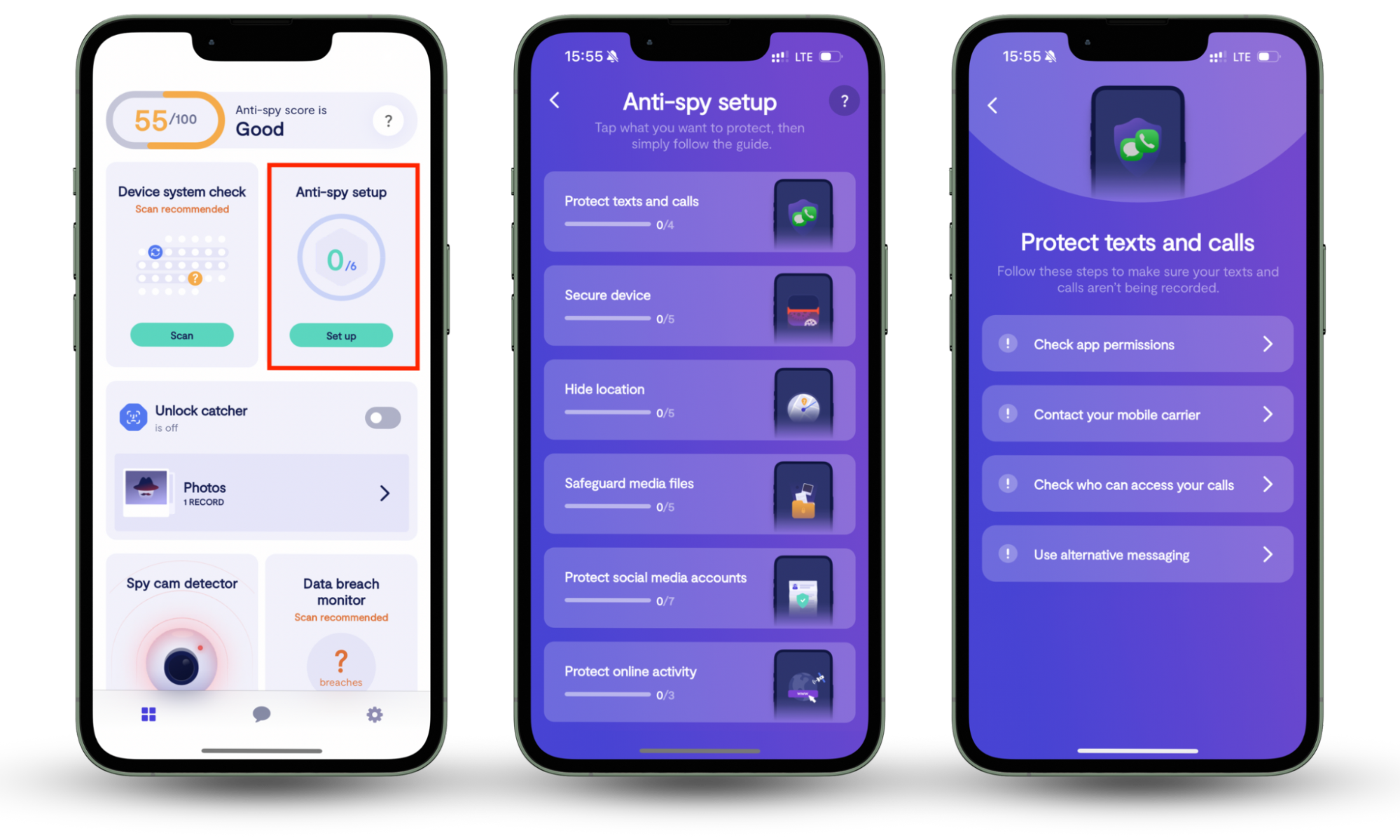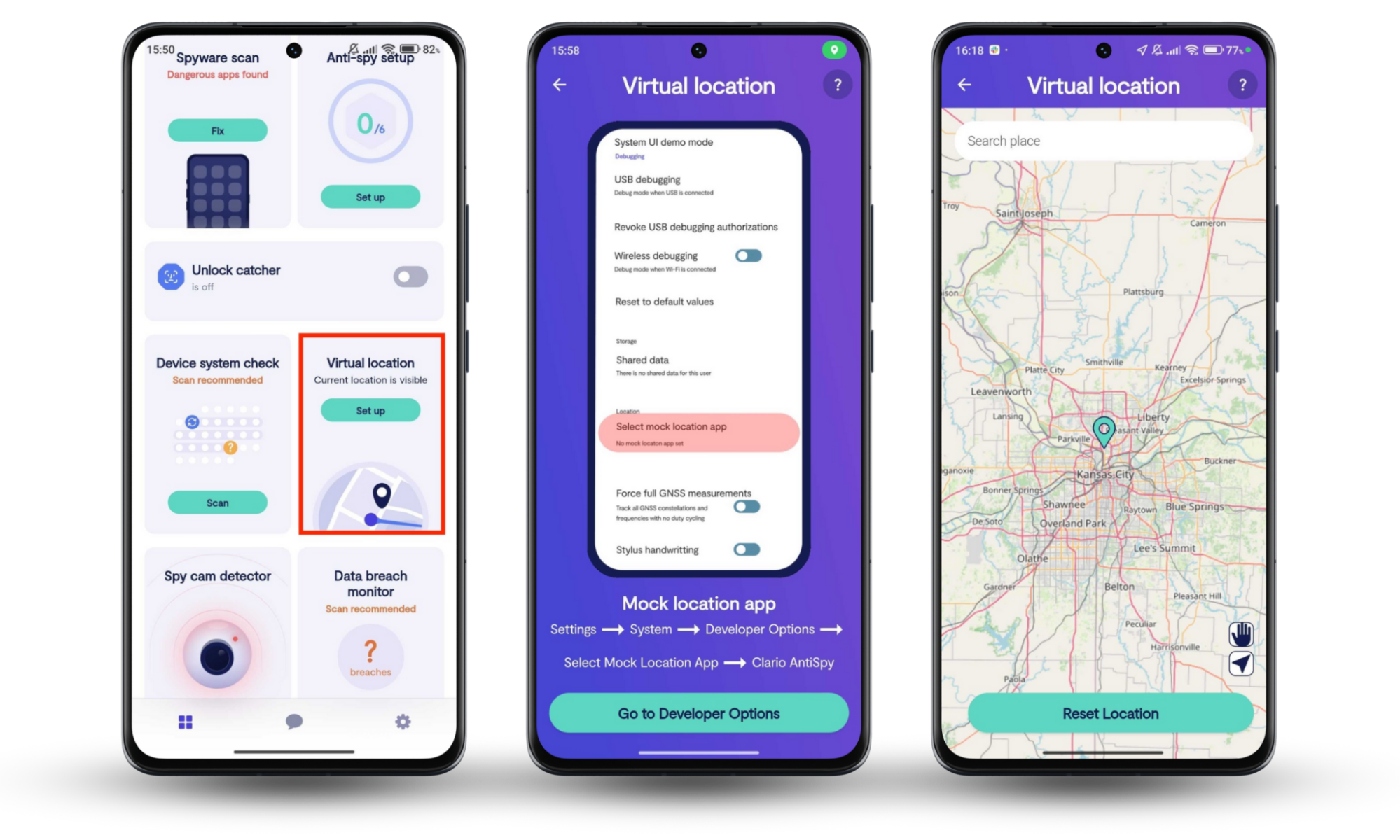Table of contents
- Tor vs. VPN
- What is the Tor browser?
- What is a VPN service?
- What’s the difference between Tor and a VPN?
- Benefits of Tor
- Benefits of a VPN
- When should you use Tor?
- Tor on Mobile: What to know for iOS 18 & Android 15
- When should you use a VPN?
- FAQ
- 1. Is Tor better than a VPN?
- 2. Is Tor secure without a VPN?
- 3. Is Tor illegal?
- 4. Is a VPN dangerous?
- 5. Should you use a VPN with Tor?
- 6. Does Clario Anti Spy offer a VPN?
- 7. Can a VPN and Tor be traced in 2025?
- Tor vs. VPN: Which tool is the better choice?
No matter why you want to stay incognito online, you’re likely to choose a Virtual Private Network (VPN) or Tor browser. These are two of the most popular options among those concerned about protecting their digital identity.
But if you are looking to choose one, which is the most suitable?
To put it simply, Tor is best for those transmitting sensitive information or bypassing strict censorship in high-risk regions. A VPN is usually a more effective solution for everyday use as it strikes a great balance between connection speed, convenience, and privacy.
However, every online user’s needs are different. So let us help you decide which one is best. Here, we’ll delve into the following issues.
Tor vs. VPN
Tor and VPN are tools used to stay anonymous online. These two perform similar but different functions.
What is the Tor browser?
The Tor browser is a free, open-source project enabling you to surf the web anonymously. The title is an acronym originating from the phrase “the onion router”. Yes, the name sounds silly, but the idea behind it is brilliant: the Tor browser network is built of layers upon layers of independent nodes run by Tor users.
What is a VPN service?
A VPN helps you protect your online privacy by creating a secure connection to any network or server over the internet. VPNs are widely used to avoid geolocation restrictions, prevent traffic sniffing, and ensure secure interaction with your shopping and banking apps.
What’s the difference between Tor and a VPN?
The key difference between Tor and a VPN is that there are multiple VPN tools and service providers available but only one Tor browser network.
Tor relies on a decentralized layer of independent nodes to transfer data securely, while VPN software connects to a central server to provide a secure VPN tunnel.
Another common difference between the two is the specifics of their use.
If your online activity is related to the transmission of extremely sensitive information or might get you in trouble in countries with strict censorship laws (like China, or Iran), Tor is the best option to go for. The reason is obvious, since VPN providers still have to be registered, pay taxes, and comply with legislation.
Better choice
If you simply want to ensure your anonymity and secure access when traveling or working from home, then a VPN is your most suitable choice.
You can use these two technologies at the same time to achieve the highest level of privacy. This will open up a Tor through a VPN connection so you can access the benefits of each. However, this is probably only to be advised if you are a technologically advanced online user.
Additionally, we must stress the importance of implementing a comprehensive approach to protecting your privacy. Many smartphone users often neglect to thoroughly read app privacy permissions and review their privacy settings because it takes time. However, by mindlessly accepting granting app permissions, you may unknowingly agree to let apps spy on you.
That’s where Clario Anti Spy’s Anti-spy setup tool comes in. It empowers you to protect your privacy by guiding you through all the necessary checklists to secure your social media accounts, phone calls, and more. Additionally, it lightens the load by presenting those checklists to you in one place so you can systematically go through them and access the suggested apps to make those changes on the spot.
Take the smart approach to protecting your privacy and try Clario’s Anti-spy setup immediately. Here’s how to get started:
- Download Clario Anti Spy, get a subscription, and set up your account.
- Find the Anti Spy Setup option, tap the Set up button.
- Follow the prompts to action each item on the list.

Benefits of Tor
- Hides your online activity. Your browsing history and cookies are automatically reset when you stop using it.
- Anti-spy protection. Tor prevents others from tracking the websites you visit.
- Anonymous identity. Tor tries to make all users look-alike to stop anyone identifying you from the characteristics of your browser or devices.
- Multi-layer encryption. In the Tor network, your traffic is redirected and encrypted several times to keep you totally anonymous.
- Free access. The Tor browser allows you access to websites blocked by your network.
Benefits of a VPN
- A VPN allows anonymous web surfing. A VPN hides your real IP address, so you can browse websites anonymously.
- A VPN removes regional restrictions. VPN servers are located across the globe, so you can overcome regional limitations and access any website to watch movies or listen to music.
- A VPN keeps a high-speed connection. Tests in 2025 show that premium VPNs are often 50x faster than Tor. As you use a specific VPN server, it avoids the "hop" latency of Tor nodes.
- A VPN surpasses censorship. It helps you avoid censorship limitations imposed by certain governments by connecting users to servers outside of a country's jurisdictions and Internet Service Providers (ISP).
- A VPN secures connection via public WI-FI. If you access the internet from a public Wi-Fi hotspot, a VPN keeps your internet connection secure.
When should you use Tor?
Tor is more effective than a VPN in the following cases:
- You want to stay safe while accessing geo-restricted content. Using Tor is a good way to protect your privacy when you’re trying to access content that’s prohibited in your country. This includes geographical limitations (accessing US-only content from Europe or Australia for example), avoiding censorship in countries like Iran and China, and much more.
- You want to access the dark web. Tor’s Hidden Services is also the gateway to the dark web. It is made up of websites that are only accessible through a Tor connection and cannot be found through search engines like Google. The dark web is often associated with criminals which is why it's illegal in some countries.
- You want to stay away from browser trackers. If you want to use the internet and leave no digital footprint, using the Tor browser is the best solution. It’s almost impossible to trace a connection to the original user, so you can surf the web without leaving any identifying signs behind.
Tor on Mobile: What to know for iOS 18 & Android 15
- Apple's iOS restricts how browsers strictly handle traffic, meaning the official Tor Browser isn't available on iPhone. Instead, iOS users should use Onion Browser (endorsed by the Tor Project).
- On Android 15, Tor can proxy your entire device's traffic, not just web browsing, if configured correctly.
When should you use a VPN?
Use VPN over Tor if:
- You want to unblock region-locked content. A VPN will help you bypass any localised restrictions if you are in a country where access to your favorite programs or streaming services is closed.
- You want to keep your internet connection private. A VPN uses the most advanced encryption to protect your data. A good VPN also ensures that the websites processing your data don't see where it came from, giving you the highest degree of anonymity.
- You want to be secure when using public Wi-FI. Using a VPN on public Wi-Fi protects your sensitive information, passwords, and other personal information from would-be hackers.
FAQ
1. Is Tor better than a VPN?
It depends on your online activity. It is the best way to avoid censorship and ensure security but provides a limited video viewing and browsing experience.
2. Is Tor secure without a VPN?
Yes. You can definitely use Tor for normal web surfing without a VPN.
3. Is Tor illegal?
While not strictly prohibited in most Western countries, the Tor browser is restricted or banned in authoritarian regimes like China and Iran. In 2025, using it in these regions without a "bridge" or VPN can flag you to ISPs.
4. Is a VPN dangerous?
Using a free VPN service may put your online security at risk. When you use a VPN server, you protect your traffic from being monitored by your ISP. But at the same time, you allow the VPN provider to spy on your traffic. Companies providing free VPN services do not keep your private information confidential and instead may share it with third parties.
5. Should you use a VPN with Tor?
Using the two tools at the same time is possible, but we do not recommend doing it. The exception is if you are an advanced user who knows exactly how to set up both a VPN and Tor so that your anonymity remains secure.
6. Does Clario Anti Spy offer a VPN?
Clario Anti Spy does not offer A VPN. However, it does provide a Virtual location feature that allows you to change your Android phone’s location completely and set it to anywhere in the world. This tool has helped multiple stalking and spying victims all over the world.
Here is how to use it on your Android phone:

7. Can a VPN and Tor be traced in 2025?
While Tor is incredibly secure, "correlation attacks" (analyzing traffic entry and exit points using AI) are becoming a theoretical threat. A VPN is easier to trace if the provider keeps logs, which is why choosing a "No-Logs" VPN is critical.
Tor vs. VPN: Which tool is the better choice?
Personal security and privacy is becoming increasingly important as governments, hackers, and even our favorite search engine Google invent more advanced ways to break our anonymity and track our behavior.
While Tor and VPN services both work to keep your identity anonymous, the latter is a more convenient choice when used correctly. Tor is a free browser that will encrypt your online activity, but it is slower, does not provide access to all websites, and can potentially lead to problems with the law. Another smart option is Clario’s Anti-spy setup software, which reduces the likelihood of falling victim to spying on your smartphone by proactively implementing safeguards.


